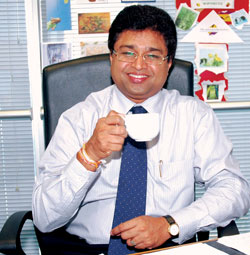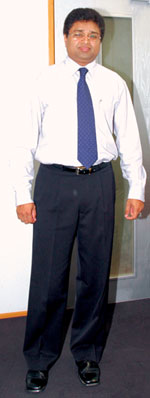
Channa Palansuriya, MD and CEO, Orit Apparels
DHARMA SRI ABEYRATNE
 Channa Probodha Palansuriya is the Managing Director and Chief
Executive Officer of Orit Apparels Lanka (Pvt) Ltd, a leading garment
manufacturing and exporting company with an annual turnover of Rs. 4
billion. Channa Probodha Palansuriya is the Managing Director and Chief
Executive Officer of Orit Apparels Lanka (Pvt) Ltd, a leading garment
manufacturing and exporting company with an annual turnover of Rs. 4
billion.
Orit caters to the US market with renowned brands such as Gloria
Vanderbilt, Glo, L.E.I. and Levi's. The company has provided 4000
employment opportunities with an investment of Rs. 2 billion for its
operation.
Under his guidance and leadership, Orit has been rated within the top
ten exporters in the Apparel Industry and within the top 100 companies
of Sri Lanka. Palansuriya has won many prestigious awards, the most
recent being the Sri Lankan Entrepreneur for the year 2002 - Silver
Award, and Silver Award of the National Chamber of Exporters of Sri
Lanka for the Garment Extra large Category for the year 2004.
He heads the Sri Lanka country office of Orit Holdings Limited in
British Virgin Island, the agent for Gloria Vanderbilt Incorporation in
USA which procures 1 million dozens of garment from Sri Lanka with a
value of Rs. 8 billion.
He also serves as the Chairman and Chief Executive Officer of GC
Lanka Clothing (Pvt) Ltd., which is also involved in the same line of
business with an annual turnover of Rs. 1.2 billion.
Every business organisation has to have a vision or set goal, which
should mention in the company's vision in order to be globally
competitive, the Managing Director and Chief Executive Officer of Orit
Apparels Lanka (Pvt) Ltd Channa Probodha Palansuriya said.
He said that vision of manufacturer or producer has to be the best
manufacturer not only in the region but also globally. Therefore, where
the Sri Lanka is concerned, it is suitable for the apparel industry
because of the skilled, well-educated, dedicated labour force.
This has paved the way for the company to reach great heights in the
sector. One of the other plus factors the Sri Lankan labour force has is
the ability to grab or absorb new techniques and instructions very fast.
Today Sri Lanka is a leading outsourcing house for number of global
apparel brands in the world due to this dedicated and skilled labour
force in the sector. Therefore, the government of Sri Lanka is giving a
lot of support for factories outside the Western Province.
 Q: What is your pathway to reach the present standard of your
enterprise? Q: What is your pathway to reach the present standard of your
enterprise?
A: It was around 1983, my father and a foreign collaborator
had been running a business in the printing sector. At that time the
apparel industry was grooming gradually.
It was controlled mainly by Indians and they were the agents and
handled the local market. Fourtunately, my father collaborated with an
Indian, who had a lot of connections in the apparel sector.
He suggested the possibilities and advantages of starting a garment
factory. In 1983, my father commissioned the garment factory with 25
machines at Moratuwa.
Later we realized the potential of the business and decided to
continue and paid more attention to the garment sector. Fortunately, the
business was increasing.
Q: How was the initial business in the printing sector ?
A: When it comes to printing sector, it is rather competitive
business. However, my father is still running this business. I get some
orders but it is a highly competitive sector.
Unless we do it on a large scale it is difficult to survive.
Q: How did you enter the apparel industry?
A: In 1992, under the President Premadasa's 200 garment
factories programme, we started two garment factories, one in
Embilipitiya while the other was in Naaula in Matale.
Due to logistical problem father wanted to shut down operations.
Subsequently he found a buyer and sold it in 1996. However, the buyer
wanted me to manage the factory and I accepted that request.
During this period, the owner of the Embilipitiya factory suggested
me to form a group and it was the starting point of Orit Apparels as a
group. Now he has started seven factories in seven locations having a
6,000 workforce.
Today we have become the number one jeans manufacturer in Sri Lanka
and we are among the top ten companies in Sri Lanka.
Q: How do you manage the human resource?
A: For a businessman, the most important and the best
investment is an efficient workforce. Monetary investment cannot surpass
human resources. Therefore, we look after them and help to improve their
lifestyle while assuring them a prosperous future. Even today most of
our initial employees are with us.
Q: How do you say that you could reach that goal?
A: Considering the way we have come so far, I strongly believe
that we can be the best jean manufacturer in this region. Currently, we
are the main supplier for Levis USA from Sri Lanka. We started the
business with Levis in a small way three years ago by manufacturing
Levis jeans.
Due to our success I think Levis USA wants to grow further with us.
We strongly maintain quality standard in our factories. I want to do a
premium product since jeans vary from high standard to low quality. My
intention is to come with a high quality product. Today if a person
wants to purchase a high quality product he has to spend around US$ 400
to 500.
Q: How far have you reached the target?
A: I say that we are somewhere in the middle on our way.
Q: What sections do you have to develop or achieve when
reaching the set goals?
A: Initially, we have to improve our volume. Therefore we are
about to reach the peak.
We produce more than 720,000 jeans per month. The export revenue is
more than US $ 5.5 million per month. We now focus on quality. Apart
from the quality improvement in product we consider improving the
quality of our human resources.
Q: You mentioned that moves are underway to uplift the quality
standard of your products. What are the steps you have taken so far and
what is your future agenda?
A: The quality handling can't be done with the computers,
therefore constant training and constant teaching of introducing new
techniques are the main criteria of quality controlling. There is no
alternative for improving quality other than making the workforce aware
of the new techniques.
Q: What are your financial policies?
A: We always make sure that we maintain good financial
disciplines. We reinvest 50 per cent of the profit from the business to
improve our standard and capabilities. |

